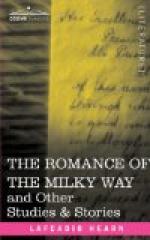[Footnote 10: Kag[’e]ro[:i] is an obsolete form of kag[’e]r[=o], meaning an ephemera.]
[Methinks that Hikoboshi
must be rowing his boat to meet his
wife,—for a mist
(as of oar-spray) is rising over the course
of the Heavenly Stream.]
Kasumi tatsu
Ama-no-Kawara ni,
Kimi matsu to,—
Ikay[=o] hodo ni
Mono-suso nurenu.
[While awaiting my lord
on the misty shore of the River of
Heaven, the skirts of my robe
have somehow become wet.]
Amanogawa,
Mi-tsu no nami oto
Sawagu-nari:
Waga matsu-kimi no
Funad[’e]-surashi mo.
[On the River of Heaven,
at the place of the august
ferry, the sound of the water
has become loud: perhaps my
long-awaited lord will soon
be coming in his boat.]
Tanabata no
Sod[’e] maku yo[:i] no
Akatoki wa,
Kawas[’e] no tazu wa
Nakazu to mo yoshi.
[As Tanabata (slumbers)
with her long sleeves rolled up,
until the reddening of the
dawn, do not, O storks of the
river-shallows, awaken her
by your cries.[11]]
[Footnote 11: Lit., “not to cry out (will be) good”—but a literal translation of the poem is scarcely possible.]
Amanogawa
Kiri-tachi-wataru:
Ky[=o], ky[=o], to—
Waga matsu-ko[:i]shi
Funad[’e]-surashi!
[(She sees that) a mist
is spreading across the River of
Heaven.... “To-day,
to-day,” she thinks, “my long-awaited lord
will probably come over in
his boat."]
Amanogawa,
Yasu no watari ni,
Fun[’e] uk[’e]t[’e];—
Waga tachi-matsu to
Imo ni tsug[’e] koso.
[By the ferry of Yasu,
on the River of Heaven, the boat is
floating: I pray you
tell my younger sister[12] that I stand
here and wait.]
[Footnote 12: That is to say, “wife.” In archaic Japanese the word imo signified both “wife” and “younger sister.” The term might also be rendered “darling” or “beloved.”]
[=O]-sora yo
Kay[=o] war[’e] sura,
Na ga yu[’e] ni,
Amanokawa-ji no
Nazumit[’e] zo koshi.
[Though I (being a Star-god)
can pass freely to and fro,
through the great sky,—yet
to cross over the River of Heaven,
for your sake, was weary work
indeed!]
Yachihoko no
Kami no mi-yo yori
Tomoshi-zuma;—
Hito-shiri ni keri
Tsugit[’e]shi omo[:e]ba.
[From the august Age of the God-of-Eight-Thousand-Spears,[13] she had been my spouse in secret[14] only; yet now, because of my constant longing for her, our relation has become known to men.]
[Footnote 13: Yachihoko-no-Kami, who has many other names, is the Great God of Izumo, and is commonly known by his appellation Oho-kuni-nushi-no-Kami, or the “Deity-Master-of-the Great-Land.” He is locally worshiped also as the god of marriage,—for which reason, perhaps, the poet thus refers to him.]




